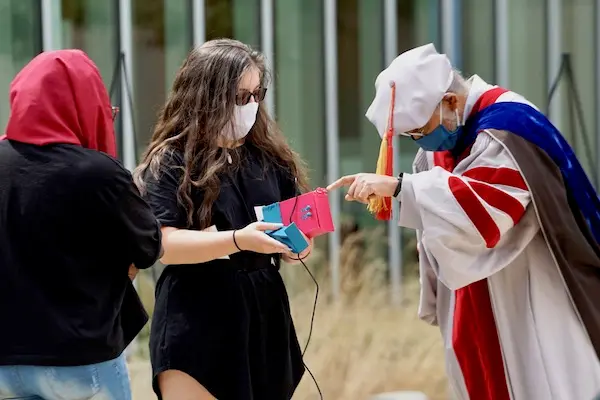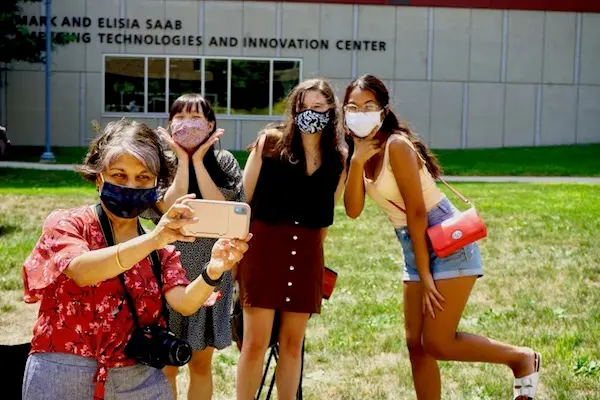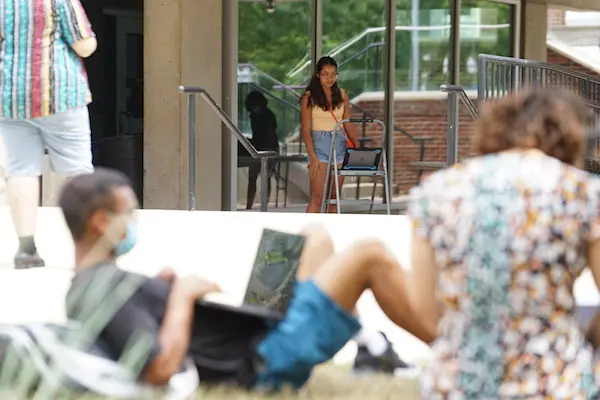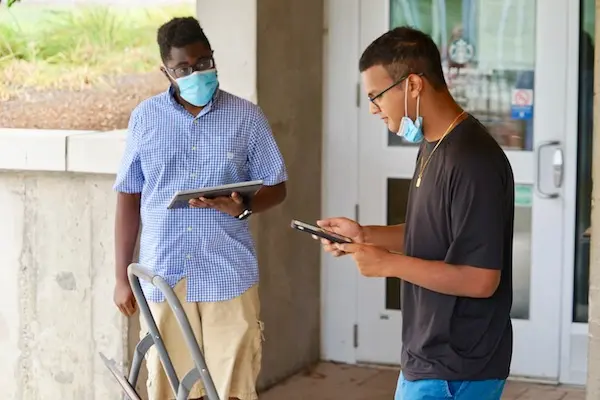Summer Program Preps First-Year and Transfer Students for Virtual Semester
 Image by Ed Brennen
Image by Ed Brennen
Prof. of Electrical and Computer Engineering Charles Thompson inspects incoming freshman Amanda Stanley's project "The Door Stopper," a device that holds a student's dorm room door open for a short period of time, during final presentations of this summer's RAMP program.
08/20/2020
By Ed Brennen
He was heading to the patio outside Starbucks to check out the design projects that 25 incoming Francis College of Engineering students worked on this summer with industry partners like Dell Technologies, Red Hat and Collins Aerospace.
The students’ group presentations put a bow on the college’s six-week Research, Academics and Mentoring Pathways (RAMP) program. Similar to UML’s Launch! and SoarCS summer programs, RAMP gives first-year and transfer students a jump start on their engineering coursework — and helps prepare them for college life in general.
Like everything, the program was held virtually this summer because of the coronavirus pandemic, although students were invited to campus to give socially distanced final presentations and enjoy an outdoor picnic. Seventeen were able to attend, and Thompson wore his regalia to create a little of the pomp found at Convocation, which will be virtual this year.
Students took two online courses — Calculus and Introduction to Engineering — for six credits, and the Centers for Learning, Advising and Student Success (CLASS) provided tutoring and weekly workshops, such as “Transitioning to University Life” and “Learning in a Virtual Environment.”
 Image by Ed Brennen
Image by Ed Brennen
Assoc. Dean of Undergraduate Affairs Kavitha Chandra takes a selfie with RAMP participants after the final presentations on North Campus.
Eilene Monahan, an incoming freshman mechanical engineering major from Stoneham, Mass., joined RAMP to meet people and get more comfortable with remote learning.
“I was a little nervous about starting college online, but I feel so much better after this program,” Monahan said. “It was a big eye-opener to see what’s required for classes and how to prepare yourself. It will really help me succeed.”
Through their design projects, students learned about data analytics and the Internet of Things by working in small, interdisciplinary teams to build WiFi-connected devices. Texas Instruments donated a LaunchPad circuit board to each student, and they learned how to write code and add modules for WiFi signals, temperature sensors, microphones and more.
Among the final projects were a smartphone notification system that reminds you to bring your mask whenever you leave home, a device that alerts students on Slack if they leave their dorm room unlocked, and a platform that helps students manage their study time.
“It’s incredible what they did in six weeks,” said Christina Phillips ’20, who recently earned her doctorate in math and science education from the College of Education and taught the program’s Introduction to Engineering course. “They learned how to adapt in a unique situation, which is a great skill in general. They also learned how to apply what they learned in a group project, which is so important for when they get out in the industry someday.”
 Image by Ed Brennen
Image by Ed Brennen
While most students came to campus for the RAMP program finale, groups made their design project presentations on Zoom so others could participate remotely. Even those on campus watched online to ensure social distancing.
Amanda Stanley, an incoming freshman from Dracut, Mass., had planned to major in mechanical engineering. But after working with the LaunchPad for six weeks, she decided to switch majors to electrical engineering.
“I learned a ton about boards and coding. It was pretty awesome,” Stanley said.
Groups met each week with professionals from their assigned industry partner (which also included Abiomed, Analog Devices, Brooks Automation and Skyworks) to gain insights on engineering careers.
They also worked with student mentors like Imane Hankour, an electrical engineering major from Acton, Mass., who participated in RAMP last year.
“It’s a really great opportunity for a lot of students,” said Hankour, who is almost a semester ahead in her coursework thanks in part to her RAMP credits. “I’m happy to see they were able to continue it virtually even after the pandemic situation.”
Assoc. Dean of Undergraduate Affairs Kavitha Chandra started RAMP three years ago to bolster the enrollment, retention and accomplishments of those who are underrepresented in engineering. Originally designed for women engineering students, the program expanded this year to include a half-dozen men.
“Women need allies from all fronts,” Chandra noted of the change, which also gave the male students a different perspective. “They are the minority in this group compared to the traditional engineering classroom, where you have maybe fewer than 10 percent female students.”
 Image by Ed Brennen
Image by Ed Brennen
Incoming computer engineering student Rishabh Dhir presents his group's design project on a Zoom webcam while teammate Nathan Uhunsere waits to speak.
Scholarships were provided by BAE Systems, Brooks Automation, Foster Corporation, Red Hat and alum Joanne Mavroides ’82, Abiomed’s director of U.S. supply chain and logistics, to help cover the program’s $2,100 tuition.
After collaborating with fellow RAMP participants on Zoom for several weeks, Nathan Uhunsere was happy to meet them in person.
“It’s nice to know that people aren’t just a disembodied torso,” joked Uhunsere, a Salem, Mass., native and transfer student from North Shore Community College who is majoring in computer engineering. Participating remotely “didn’t make it feel any worse at all. It was fantastic.”
That was Chandra’s goal.
“Despite the challenges, it turned out to be a really nice opportunity to learn how to work with each other when we’re not next to each other,” she said. “Everyone made an effort in the COVID situation to figure out how to engage and participate. Overall, it was really successful.”



